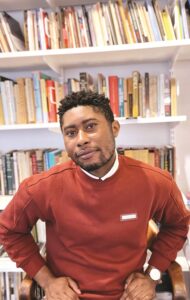Growing up in a small farming village in southeastern Nigeria, Bhion Achimba was not supposed to become a writer. His family lacked the resources to send him to college, and they hoped his drafting skills might land him a job as an architect.

Two encounters with literature changed his trajectory. The first was his mother’s dramatic recitations, from memory, of monologues from Shakespeare’s Julius Caesar. “My mom is a little dramatic, even though she doesn’t present as such,” says Achimba, who is currently a writing fellow at the Fine Arts Work Center in Provincetown. “It sounded very grand, very lofty. It did not fit the condition of her reality in the village where she lived.”
The second was studying William Wordsworth’s “The Solitary Reaper” in secondary school. The poem is about a traveler passing through a small village and hearing a woman singing in the fields. It reflected Achimba’s experience so closely that he realized he could write poetry as well. “I felt like — well, if this man wrote this, and we’re compelled to study it in school, then the mundane realities of my own village are worth writing about,” he says. “This, too, is literature. My experience is literature.”
Another influence in his development as a writer came from observing the interplay of sound and language in devotional ceremonies at his mother’s family’s home. (In Igbo religion, a family serves as custodian of the local deity, keeping a shrine in their home for others to visit.) Achimba would sit quietly and watch the worshippers since, as a Christian, he was not allowed to participate.
“The rituals were curated with the sounds of gongs punctuating the local priest’s incantations and chants,” says Achimba. “I would be in my little corner listening to it, imagining what it would be like to join them.”
In 2014, Nigeria passed a national law that prohibited same-sex marriage. The law also made gay clubs and organizations illegal, and it became a crime to “witness, abet, and aid” such events or groups. As a gay man, Achimba found himself stripped of his constitutional rights without protection. “The purpose of this law was not necessarily to convict queer citizens,” says Achimba, “but rather to scapegoat and imperil their lives by criminalization.”
Three years later, Achimba was assaulted and kidnapped after publishing an article criticizing the growing anti-queer sentiment in Nigeria. While he survived the experience, the threats against his life were so serious that he went into hiding and spent two years in a safehouse run by Amnesty International in the northern part of the country. He also lost his job.
“I trained and worked as a high school teacher before it happened, but an openly gay person cannot work in the schools,” he says. “It was a bleak situation.”
Achimba is now a refugee, a status that has become an important part of his identity. “Being an openly queer person in Nigeria complicates the rest of your life,” he says. “It stops being just a reality and becomes a condition.”
Just as he began to contemplate joining a migrant caravan headed to Europe, Achimba received a Scholar at Risk fellowship at Harvard University in 2019. He spent a year teaching as a visiting poet in the English department. He then began an M.F.A. program in literary arts at Brown, from which he will graduate this spring. His thesis focuses on the civil war in Nigeria in the 1960s, and he is working on converting it into a book. “I feel incredibly lucky and privileged to have been granted opportunity and access to these two institutions,” he says.
But being a Black man in America has not been quite the reprieve he imagined. In a 2020 opinion piece for the New York Times, Achimba wrote about the murders of Ahmaud Arbery and George Floyd and how they made him aware of the different kinds of danger here than the ones he faced in Nigeria.
“Each time I tell someone why I am here, the sad irony of it hurts like a gut punch,” he says. “I’ve traded one perilous identity — being gay in Nigeria — for yet another one: being a Black man in America. The anguish cuts deep to the bone.”
In the meantime, he has expanded the subject matter of his writing in response to his new environment. While he plans to continue working on his book manuscript, Achimba has shifted his focus to creative writing, some of it inspired by Provincetown itself.
“I’ve been writing about water,” he says, “about the way that the landscape that surrounds the city is so bare, so naked, and so alive. The dunes, they oscillate. The landscape is a living thing. It moves.”
Since arriving on the Outer Cape, he has also completed a poetry collection about his refugee experience and what he describes as “the dislocation that comes from moving.” He is working on a novel as well, which he says is about a boy and his “bastard dog” searching for identity in a remote farming village in southeastern Nigeria.
“This fellowship is an opportunity to do as much writing and reading as possible,” says Achimba. “Writing is where I think. It helps me clarify things and understand what is going on in my life. Of course, writing has its frustrating moments, but I can manage that. At least the threats are no longer external.”
